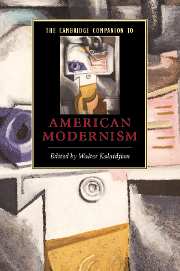Book contents
11 - Social representations within American modernism
from Part III - Society
Published online by Cambridge University Press: 28 May 2006
Summary
Measuring density
Unreal city . . .
A crowd flowed over London Bridge, so many . . .
Vienna London
Unreal
T. S. Eliot, The Waste Land“It’s curious,” she said. “After the war New York . . . Nobody can keep away from it.”
John Dos Passos, Nineteen NineteenA man is indeed a city, and for the poet there are no ideas but in things.
William Carlos Williams, PatersonWe have the bright-lights, the bridges, the Yankee Stadium . . .
Joy Davidman, Twentieth-Century AmericanismThe modern city, as astute critic and vast walker of European cities Walter Benjamin noted, seems at once to epitomize and refute Marx's famous description of Capitalism: All that is solid melts into air. A location understood at its roots to be solidly constructed of bricks and mortar, of concrete and steel, it is full of the ephemera of paper handbills flying down a windy alley, discarded trash left on a street corner, myriad faces glimpsed momentarily in the flow of the crowd: “The apparition of these faces in the crowd; / Petals on a wet, black bough.” The city as site of modern life is a cliché by now. In America, modernism was always an afterthought. So, in Nineteen Nineteen, when ace pilot, Lieutenant Charley Anderson, returns from the war to New York, he looks up Paul and Eveline Johnson in their Greenwich Village apartment because they are the only people he knows in the city after meeting on a ship crossing over, flirting, and drinking together in the mad joy of armistice. “‘My brother wanted me to go into a Ford agency with him out in the Twin Cities, but how can you keep them down on the farm after they’ve seen Paree?’ ‘But New York’s the capital now,’” replies his hostess.
- Type
- Chapter
- Information
- The Cambridge Companion to American Modernism , pp. 261 - 283Publisher: Cambridge University PressPrint publication year: 2005
- 1
- Cited by



